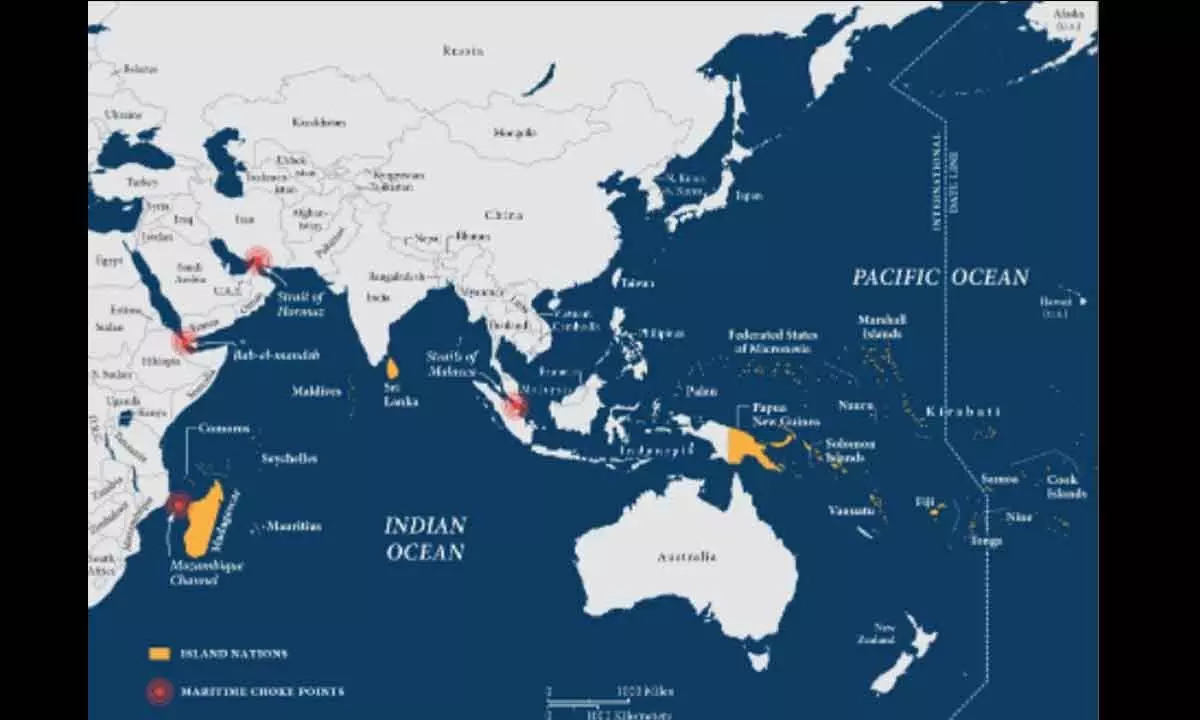Quad summit impacts Indo-Pacific geoplitics
The joint statement from the Summit spells out the multiple areas where China will face challenges from the Quad members
image for illustrative purpose

Geopolitics observers pay close attention to the words global leaders pick while framing their official statements, as these keywords spell out more than the statement itself. Diplomacy is all about sending out clear messages in a subtle tone. This is what Prime Minister Narender Modi and global leaders did at the Quad Leader Summit 2022.
PM Modi, while speaking at the Quad Leaders' Summit, said, "Quad has made an important place for itself in the world in such a short span of time. Today, Quad's scope has become extensive, its form effective. Our mutual trust and determination give democratic powers new life and vigour."
The keywords in the above statement are "important place", "short span of time", "its form effective." and "democratic powers new life", which may sound straightforward yet have a profound message for China to recheck its adventure in the Indo-pacific region.
The Indo-Pacific region has become the new geopolitical frontier between countries structured on democratic values and those structured on communism (China and Russia). In time, we will find out if the region also becomes the centre of military conflict between the West and Communist nations, as we witness in Ukraine. However, for now, it has become clear that the Quad grouping has become the pivot around which global powers are challenging Chinese hegemonic behaviour. And, there is a genuine concern that has brought the "Quad's" four leaders — India, the United States, Japan, and Australia together, argue global geopolitical analysts. Each of the Quad nations has witnessed "progressive deterioration" in bilateral ties with China in recent years," and this "appears to have given them new impetus."
Quad is an "informal" grouping that is "regarded as part of the US's efforts to oppose China's Indo-Pacific reach and territorial claims." However, the Quad leader summit 2022 hosted in Tokyo is considered "one of the most crucial summits in recent years" by analysts for a reason.
In fewer than two years, the world's leaders have met "for the fourth time", including once "in Washington in September and twice remotely." This clearly emphasises the significance of Quad, "which was primarily a notion until 2017", for the member States. Thus, global observers believe the Quad Leader summit 2022 has wider "implications for the Indo-Pacific region's geopolitics and security."
Quad is gaining significance not just among its four major nations, India, the US, Australia and Japan, but also among countries in the Indo-pacific region is visible at the Summit that has included fourteen other countries.
The joint statement from the Summit spells out the multiple areas where China will face challenges from the Quad members. There is an emphasis on keeping the Indo-Pacific "free and open", which means members will use their navies to dominate the region.
With an eye on China, the Quad has launched Indo-Pacific Partnership for Maritime Domain Awareness (IPMDA) to bolster surveillance and security In the Indo-Pacific region.
According to the group, there are vast benefits of IPMDA; at a minimum, it will allow tracking of "dark shipping" and other tactical-level activities, such as rendezvous at sea. "The move will also address the Chinese menace of illegal fishing in the Indo-Pacific."
On the military front, Taiwan seems to be the next flashpoint. United States President Joe Biden remarked that the US is ready "to use force to defend Taiwan against Chinese invasion," clearly indicating that Taiwan will be the next international flashpoint between the Democracies and China. Later, he clarified that Washington's "strategic ambiguity" policy remains in effect." This does not change the fact that "this is the third time in recent months" that Biden has spoken of defending Taiwan from a Chinese attack. Thus, one cannot rule out a deeper and increased engagement of Quad in giving "self-ruled Taiwan the ability to defend itself."
Ahead of the Quad summit in Tokyo, President Joe Biden launched the Indo-Pacific Economic Framework for Prosperity (IPEF), a new, US-led Asia-Pacific trade initiative with 13 countries, including India and Japan. The "alliance is deemed a counterweight to China's aggressive expansion in the region." The IPEF was unveiled in the Japanese capital in the presence of Japanese Prime Minister Kishida Fumio. Biden added, "This framework is a commitment to working with our close friends and partners in the region on challenges that matter most to ensuring economic competitiveness in the 21st century".
The enthusiasm among Quad leaders to promote the strategic grouping is a clear indicator that they are committed to challenging China's global economic powerhouse status and its illegal ways of exploiting nations and natural resources in the Indo-Pacific region.
Last word: List of countries who will be 'initial partners' of the US-led Indo-Pacific Economic Framework released: US, Australia, Brunei, India, Indonesia, Japan, South Korea, Malaysia, New Zealand, Philippines, Singapore, Thailand and Vietnam.
(The author is Founder, MyStartup TV)

